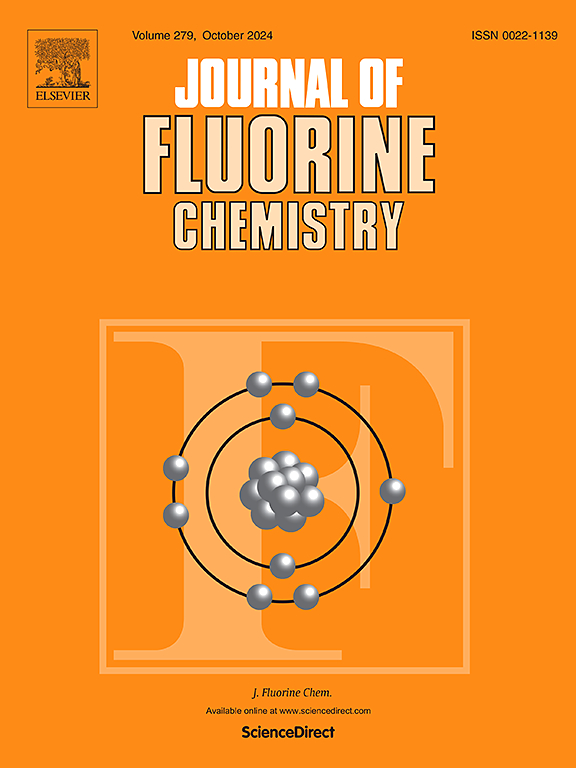A simplified GMP-compliant cassette synthesis for ruthenium-mediated 18F-deoxyfluorination of [18F]FPATPP from a phenolic precursor
IF 1.9
4区 化学
Q3 CHEMISTRY, INORGANIC & NUCLEAR
引用次数: 0
Abstract
Ruthenium-mediated 18F-deoxyfluorination of phenols is a fairly new, but highly underutilized, labeling method option of tracers for positron emission tomography (PET). Most of the published methods are directed toward peptide syntheses and include extensive preparation steps. This study aimed to simplify ruthenium-mediated 18F-deoxyfluorination of [18F]FPATPP by using the TRASIS AllinOne synthesis platform. This protocol takes minimal preparation time (1 h) and applies a straightforward synthesis that can be used to produce tracers from their electron-rich phenolic precursors bearing protic functional groups such as alcohols and amines. The new simplified cassette method afforded a novel cannabinoid receptor 1 specific tracer [18F]FPATPP with a radiochemical yield of 34 ± 2 %, radiochemical purity of ≥ 97 %, and a molar activity of 620 ± 75 GBq/µmol. The total synthesis time was 55 min. In addition, we developed an attachable accessory compatible with TRASIS AllinOne to enable needle movement to enhance the synthesis yield. Our results broaden the possibilities of a cassette based synthesis development for 18F-labeled molecules and bridge the gap between research and GMP compatible synthesis methods.

从酚醛前体制备[18F]FPATPP的钌介导18F脱氧氟化的简化的符合gmp的盒式合成
钌介导的酚类18f脱氧氟化是一种相当新的,但高度未充分利用的标记方法,用于正电子发射断层扫描(PET)。大多数已发表的方法都是针对肽的合成,包括广泛的制备步骤。本研究旨在利用TRASIS AllinOne合成平台,简化钌介导的[18F]FPATPP的18F脱氧氟化反应。该方案只需最少的准备时间(1小时),并适用于直接合成,可用于从具有质子官能团(如醇和胺)的富电子酚前体生产示踪剂。新的简化盒法获得了一种新的大麻素受体1特异性示踪剂[18F]FPATPP,其放射化学产率为34±2%,放射化学纯度≥97%,摩尔活性为620±75 GBq/µmol。总合成时间为55分钟。此外,我们开发了一个与TRASIS AllinOne兼容的附加附件,使针头能够移动,以提高合成收率。我们的研究结果拓宽了基于盒的18f标记分子合成开发的可能性,并弥合了研究与GMP兼容合成方法之间的差距。
本文章由计算机程序翻译,如有差异,请以英文原文为准。
求助全文
约1分钟内获得全文
求助全文
来源期刊

Journal of Fluorine Chemistry
化学-无机化学与核化学
CiteScore
3.80
自引率
10.50%
发文量
99
审稿时长
33 days
期刊介绍:
The Journal of Fluorine Chemistry contains reviews, original papers and short communications. The journal covers all aspects of pure and applied research on the chemistry as well as on the applications of fluorine, and of compounds or materials where fluorine exercises significant effects. This can include all chemistry research areas (inorganic, organic, organometallic, macromolecular and physical chemistry) but also includes papers on biological/biochemical related aspects of Fluorine chemistry as well as medicinal, agrochemical and pharmacological research. The Journal of Fluorine Chemistry also publishes environmental and industrial papers dealing with aspects of Fluorine chemistry on energy and material sciences. Preparative and physico-chemical investigations as well as theoretical, structural and mechanistic aspects are covered. The Journal, however, does not accept work of purely routine nature.
For reviews and special issues on particular topics of fluorine chemistry or from selected symposia, please contact the Regional Editors for further details.
 求助内容:
求助内容: 应助结果提醒方式:
应助结果提醒方式:


